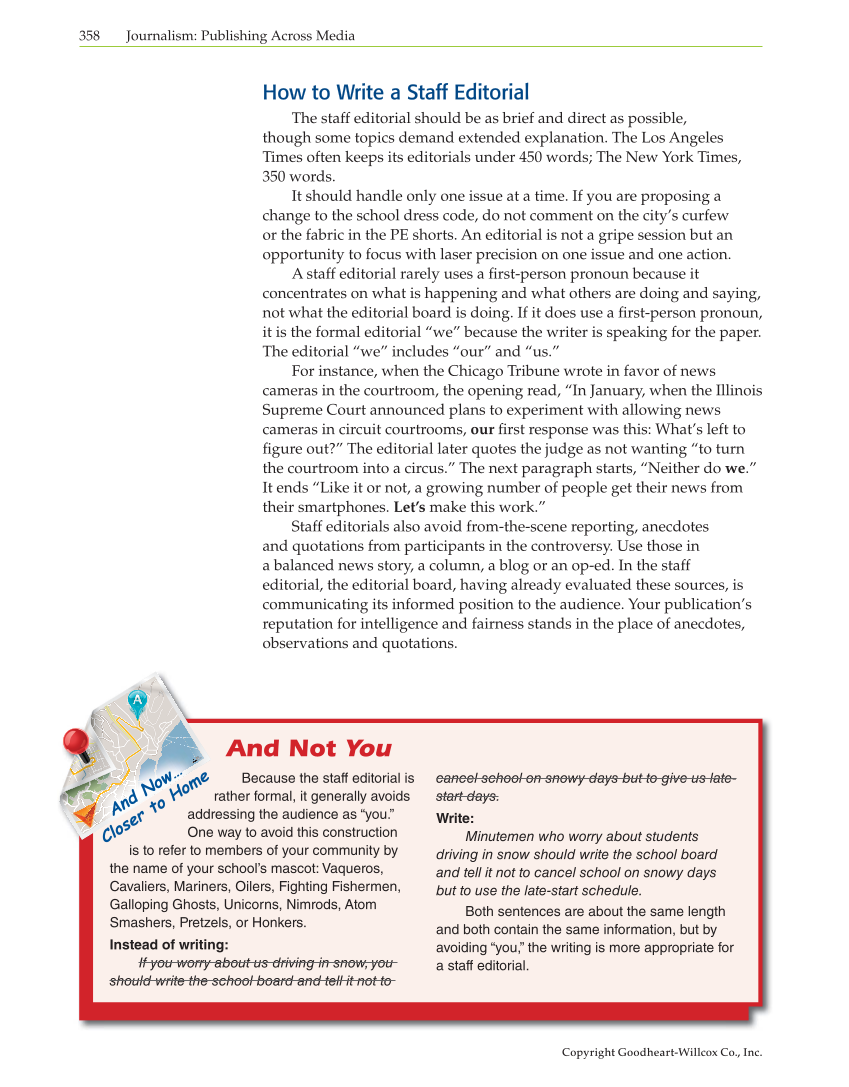Copyright Goodheart-Willcox Co., Inc. 358 Journalism: Publishing Across Media How to Write a Staff Editorial The staff editorial should be as brief and direct as possible, though some topics demand extended explanation. The Los Angeles Times often keeps its editorials under 450 words The New York Times, 350 words. It should handle only one issue at a time. If you are proposing a change to the school dress code, do not comment on the city’s curfew or the fabric in the PE shorts. An editorial is not a gripe session but an opportunity to focus with laser precision on one issue and one action. A staff editorial rarely uses a fi rst-person pronoun because it concentrates on what is happening and what others are doing and saying, not what the editorial board is doing. If it does use a fi rst-person pronoun, it is the formal editorial “we” because the writer is speaking for the paper. The editorial “we” includes “our” and “us.” For instance, when the Chicago Tribune wrote in favor of news cameras in the courtroom, the opening read, “In January, when the Illinois Supreme Court announced plans to experiment with allowing news cameras in circuit courtrooms, our fi rst response was this: What’s left to fi gure out?” The editorial later quotes the judge as not wanting “to turn the courtroom into a circus.” The next paragraph starts, “Neither do we.” It ends “Like it or not, a growing number of people get their news from their smartphones. Let’s make this work.” Staff editorials also avoid from-the-scene reporting, anecdotes and quotations from participants in the controversy. Use those in a balanced news story, a column, a blog or an op-ed. In the staff editorial, the editorial board, having already evaluated these sources, is communicating its informed position to the audience. Your publication’s reputation for intelligence and fairness stands in the place of anecdotes, observations and quotations. And Not You Because the staff editorial is rather formal, it generally avoids addressing the audience as “you.” One way to avoid this construction is to refer to members of your community by the name of your school’s mascot: Vaqueros, Cavaliers, Mariners, Oilers, Fighting Fishermen, Galloping Ghosts, Unicorns, Nimrods, Atom Smashers, Pretzels, or Honkers. Instead of writing: If you worry about us driving in snow, you should write the school board and tell it not to cancel school on snowy days but to give us late- start days. Write: Minutemen who worry about students driving in snow should write the school board and tell it not to cancel school on snowy days but to use the late-start schedule. Both sentences are about the same length and both contain the same information, but by avoiding “you,” the writing is more appropriate for a staff editorial.
